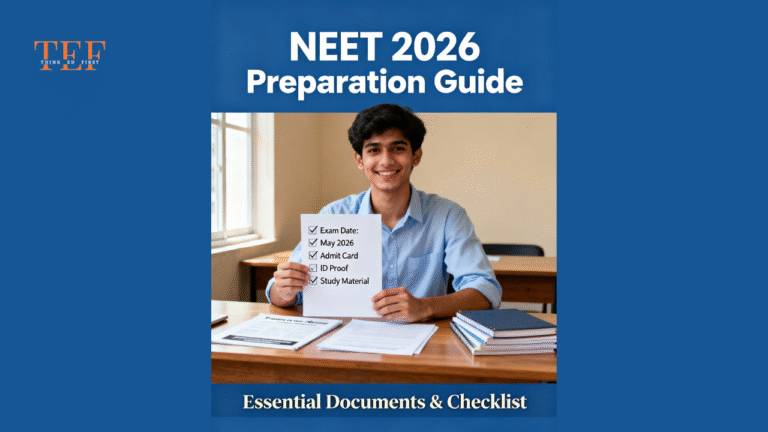Have you ever wondered how to tackle the NEET exam without compromising on either speed or accuracy? This is a question that haunts many aspirants as they prepare for one of the most competitive exams in India. The challenge lies in managing time effectively while ensuring every answer is correct.
The NEET exam demands a strategic approach. With strict time limits and a negative marking system, every second counts. Mastering fundamental concepts and employing smart strategies can make a significant difference. Our guide will help you refine your preparation, manage time better, and build confidence.
We’ll share insights from trusted educational resources and widely recognized coaching practices. These strategies will help you focus on key areas, understand the exam pattern, and practice effectively. Stay tuned for actionable tips that can transform your preparation journey.
Understanding the NEET Exam Pattern and Core Concepts
Understanding the NEET exam pattern is the first step toward effective preparation. The exam consists of 180 questions divided into three main subjects: Physics, Chemistry, and Biology. Knowing how these questions are distributed helps in planning a focused study strategy.
Exam Structure and Question Distribution
The NEET exam is designed to test your knowledge across key subjects. Here’s a breakdown of the question distribution:
| Subject | Number of Questions |
|---|---|
| Physics | 45 |
| Chemistry | 45 |
| Biology | 90 |
This structure highlights the importance of Biology, which carries the highest weightage. Allocating time wisely across subjects is crucial for success.
Mastering Fundamental Concepts in Physics, Chemistry, and Biology
Mastering the core concepts in each subject is essential for answering questions quickly and accurately. NCERT textbooks are the foundation for building this knowledge. They cover all the topics included in the syllabus and provide clear explanations.
Focus on high-weightage topics like Mechanics in Physics, Organic Chemistry, and Human Physiology in Biology. Regular practice and revision will help solidify your understanding. Incorporating a structured study routine ensures consistent progress.
Understanding the exam pattern not only reduces anxiety but also improves time management. Use mock tests to simulate the exam environment and identify areas for improvement. This approach will help you tackle the exam with confidence.
Developing a neet speed accuracy balance: Strategies and Techniques
Effective preparation involves mastering techniques that enhance both efficiency and correctness. To tackle competitive exams, candidates must refine their approach to handling questions swiftly and accurately. This section explores proven strategies to achieve this balance.
Learning Shortcuts, Tricks, and Quick Calculation Methods
Shortcuts and quick calculation methods can save valuable time during the exam. In subjects like Physics and Chemistry, mastering these techniques is essential. For instance, using mnemonic devices for formulas or applying approximation methods can simplify complex problems.
Regular practice with these shortcuts ensures they become second nature. Focus on high-weightage topics like Organic Chemistry and Mechanics. Incorporating structured practice sessions helps reinforce these techniques effectively.
Boosting Reading Speed and Maintaining Accuracy
Reading speed plays a critical role in understanding and answering questions quickly. Techniques like skimming and scanning can help identify key information in lengthy passages. However, maintaining accuracy is equally important.
Timed practice sessions and mock tests are excellent ways to improve both speed and precision. Analyzing performance in these sessions helps identify areas for improvement. For more tips on managing time effectively, check out this comprehensive guide.
By combining these strategies, candidates can enhance their overall performance. Structured preparation and consistent practice are the keys to success.
Practice Approaches and Time Management for NEET Success
Achieving success in competitive exams requires a blend of discipline and smart planning. A well-structured study routine and regular practice are essential for mastering the exam format. Let’s explore effective strategies to optimize your preparation.
Designing a Structured Study Schedule and Regular Practice Sessions
Creating a study schedule helps you cover all topics systematically. Divide your time into manageable blocks, focusing on high-weightage subjects like Biology. Regular practice sessions reinforce concepts and improve problem-solving skills.
Use techniques like the Pomodoro method to maintain focus. Study for 25 minutes, then take a 5-minute break. This approach enhances retention and reduces fatigue. Here’s a suggested study interval plan:
| Activity | Duration |
|---|---|
| Study Session | 25 minutes |
| Short Break | 5 minutes |
| Long Break (after 4 sessions) | 15 minutes |
Implementing Mock Tests and Analyzing Performance
Mock tests are crucial for simulating real exam conditions. They help you practice answering questions within the time limit. Take at least 10-15 mock tests in the final month of preparation.
After each test, analyze your performance. Identify common errors and focus on improving weak areas. This feedback loop ensures continuous progress and boosts confidence.
Adapting Strategies and Enhancing Time Management Skills
Adapt your study plan based on mock test results. Allocate more time to challenging topics and revise key concepts regularly. Use shortcuts and memorization techniques to solve problems quickly.
Effective time management ensures you cover all subjects thoroughly. Practice solving questions within one minute to improve speed and accuracy. Consistent effort and smart planning are the keys to success.
Conclusion
Mastering the art of time management and precision is key to excelling in competitive exams. By understanding the exam pattern and focusing on core concepts, you can approach questions with confidence.
Regular practice and mock tests are essential for improving performance. Analyzing your results helps identify areas for improvement and refine your strategy.
Stay disciplined and consistent in your preparation. With the right techniques and focus, achieving your desired score is within reach. Keep refining your approach to ensure success on exam day.





